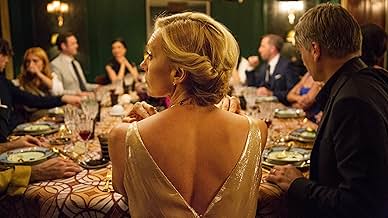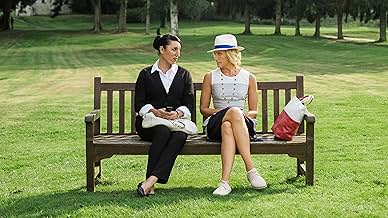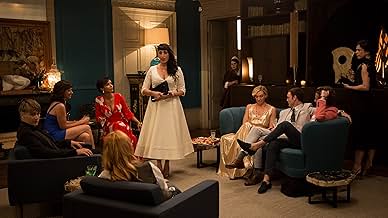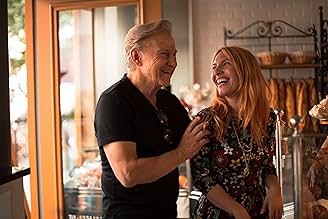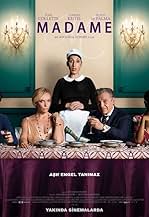Madame
- 2017
- Tous publics
- 1h 31m
IMDb RATING
6.1/10
9K
YOUR RATING
A rich man's fortune cookie: "Tonight you'll meet someone special." He meets a maid, made aristocrat for the evening to avoid 13 at the dinner party in Paris. They spend the night together, ... Read allA rich man's fortune cookie: "Tonight you'll meet someone special." He meets a maid, made aristocrat for the evening to avoid 13 at the dinner party in Paris. They spend the night together, while the hostess stalks them.A rich man's fortune cookie: "Tonight you'll meet someone special." He meets a maid, made aristocrat for the evening to avoid 13 at the dinner party in Paris. They spend the night together, while the hostess stalks them.
Featured reviews
The comedy of manners genre uses satire to expose the rituals and affectations that pass for social politeness. Driven by witty dialogue and characterisation, it laughs at the best and worst in human behaviour. A good example is the comedy drama Madame (2017) that blends themes of race and class in a charming Cinderella tale of self-discovery.
The plot line is deceptively straightforward. Pretentious American couple Anne (Toni Collette) and Bob (Harvey Keitel) have rented an elegant manor in trendy Paris to impress their friends and clients. On the eve of a 'spare-no-expense' formal dinner a guest cancels, leaving the dinner table with an odd number of guests. Anne instructs her shy servant Maria (Rossy de Palma) to make up the number, pretend to be a Spanish lady friend, and say very little. After a few drinks, Maria becomes outgoing and is noticed by British art broker David (Michael Smiley) who is convinced she is a mysterious aristocrat. To Anne's horror they begin seeing each other despite desperate attempts to stop them.
Woven into this simple plot is a portrait of a lowly maid hoping to be loved for who she is, not what she does. Her nemesis is Anne, the wicked witch who wants to keep her in place. While Keitel and Smiley competently fill their supporting roles, the emotional energy comes entirely from the two female stars. Collette portrays scandalised with consummate bitchery as she engineers what she calls a 'slow-motion car crash' and de Palma does a heart-warming rendition of the maid who dares to hope. Brilliantly filmed in Parisian locations, its narrative twists and turns play on themes of class ritual and racial stereotype. The script is at times laboured with trite references to knowing one's place, but it is de Palma who keeps the story alive. She uses those big innocent eyes to convey how it feels to suddenly believe that someone really loves you, all while being oblivious to the masquerade into which she has been thrust. De Palma's unconventional aesthetics become a device to highlight the deeper values of kind-hearted character and the superficiality of skin-deep beauty.
This slow-burning comedy is a study of inflated egos and natural humility. Its minimal plot allows the focus to stay on the battle between primal feminine drives, one stopping at nothing to preserve the social order, the other swept up in a Cinderella dream. Not all fairy tales have conclusive endings and nor does this one. But it has enough laughter and warm-hearted moments to be worth watching despite its BYO ending.
The plot line is deceptively straightforward. Pretentious American couple Anne (Toni Collette) and Bob (Harvey Keitel) have rented an elegant manor in trendy Paris to impress their friends and clients. On the eve of a 'spare-no-expense' formal dinner a guest cancels, leaving the dinner table with an odd number of guests. Anne instructs her shy servant Maria (Rossy de Palma) to make up the number, pretend to be a Spanish lady friend, and say very little. After a few drinks, Maria becomes outgoing and is noticed by British art broker David (Michael Smiley) who is convinced she is a mysterious aristocrat. To Anne's horror they begin seeing each other despite desperate attempts to stop them.
Woven into this simple plot is a portrait of a lowly maid hoping to be loved for who she is, not what she does. Her nemesis is Anne, the wicked witch who wants to keep her in place. While Keitel and Smiley competently fill their supporting roles, the emotional energy comes entirely from the two female stars. Collette portrays scandalised with consummate bitchery as she engineers what she calls a 'slow-motion car crash' and de Palma does a heart-warming rendition of the maid who dares to hope. Brilliantly filmed in Parisian locations, its narrative twists and turns play on themes of class ritual and racial stereotype. The script is at times laboured with trite references to knowing one's place, but it is de Palma who keeps the story alive. She uses those big innocent eyes to convey how it feels to suddenly believe that someone really loves you, all while being oblivious to the masquerade into which she has been thrust. De Palma's unconventional aesthetics become a device to highlight the deeper values of kind-hearted character and the superficiality of skin-deep beauty.
This slow-burning comedy is a study of inflated egos and natural humility. Its minimal plot allows the focus to stay on the battle between primal feminine drives, one stopping at nothing to preserve the social order, the other swept up in a Cinderella dream. Not all fairy tales have conclusive endings and nor does this one. But it has enough laughter and warm-hearted moments to be worth watching despite its BYO ending.
This is totally a Rossy de palma's Movie. She takes the cake with her awesome performance be it the comic timing or the seriousness of her character. Toni and Harvey fo good jobs in their roles. But sadly the ending was too disappointing. I mean it could have been better. Overall worth a watch though.
I feel that 'Madame' needs a few words spoken in its defence.
Trying to keep this as spoiler-free as possible, this is a lovely, bitter-sweet little dramedy, unusual in its ending. And this latter element is precisely what is charming about it. It is not just another Disney-like, implausible, 'Cinderella' story of the type Hollywood throws up at us with admirable frequency. Though by far not a masterpiece, and in search of a character, being not quite a drama, nor quite a comedy, the ending makes it stand out.
In my view, the ending is perfect precisely because it is more realistic, it feels more real. Characters who live in a false world (keeping thin by forcefully throwing up, or organising luxurious parties while being on the verge of bankruptcy) remain in their false world, continuing to suffer in their gilded cages. Is that not the perfect punishment? People who were always dignified, who had self-respect and a certain untouched morality, retain their dignity, their esteem, in their own eyes, and in the eyes of the audience. Is that not an effective ending? It is not necessary to always have the same reversal of roles, easily served, and so easily digested, dispensed with, and forgotten.
Every time a script goes outside the usual, overused Hollywood trope, audiences start to bitch and moan at how awful this is, how unsatisfied they are. I have a strong feeling, that if it had the ending everyone is so anxious for, these same people would say: 'Well, where's the novelty in that? We've seen that before'.
Haven't we seen enough 'Maids in Manhattan'? Do we really need yet another fairly empty romance story with the usual players - the low-born or low-placed but (always!) beautiful girl, the quirky, but ridiculous best friend, the rich and powerful stud who crosses the social divide for love? Such films are sweet, but outside their very narrow romantic premise, sweet as that may be, they say very little either about society, or about the people in it, their character, their self-perception, their understanding of the world around them. 'Madame' has something to say about these things. It says it with much less panache than 'Remains of the Day', but it is closer to the real world of today than other romantic comedies.
No, I do not consider 'Madame' a masterpiece. Nor do I feel it wants to be such. If its aims are modest, they are still interesting and valid, and if the satire and social commentary are modest, this does not make them necessarily less effective, or less intelligent.
Perhaps giving it a 7 is too generous (or, depending on ones perspective and understanding, not generous enough). Yet I feel the ending does merit recognition, and if I gave the rest a six, the ending pulls in a star on its own.
Trying to keep this as spoiler-free as possible, this is a lovely, bitter-sweet little dramedy, unusual in its ending. And this latter element is precisely what is charming about it. It is not just another Disney-like, implausible, 'Cinderella' story of the type Hollywood throws up at us with admirable frequency. Though by far not a masterpiece, and in search of a character, being not quite a drama, nor quite a comedy, the ending makes it stand out.
In my view, the ending is perfect precisely because it is more realistic, it feels more real. Characters who live in a false world (keeping thin by forcefully throwing up, or organising luxurious parties while being on the verge of bankruptcy) remain in their false world, continuing to suffer in their gilded cages. Is that not the perfect punishment? People who were always dignified, who had self-respect and a certain untouched morality, retain their dignity, their esteem, in their own eyes, and in the eyes of the audience. Is that not an effective ending? It is not necessary to always have the same reversal of roles, easily served, and so easily digested, dispensed with, and forgotten.
Every time a script goes outside the usual, overused Hollywood trope, audiences start to bitch and moan at how awful this is, how unsatisfied they are. I have a strong feeling, that if it had the ending everyone is so anxious for, these same people would say: 'Well, where's the novelty in that? We've seen that before'.
Haven't we seen enough 'Maids in Manhattan'? Do we really need yet another fairly empty romance story with the usual players - the low-born or low-placed but (always!) beautiful girl, the quirky, but ridiculous best friend, the rich and powerful stud who crosses the social divide for love? Such films are sweet, but outside their very narrow romantic premise, sweet as that may be, they say very little either about society, or about the people in it, their character, their self-perception, their understanding of the world around them. 'Madame' has something to say about these things. It says it with much less panache than 'Remains of the Day', but it is closer to the real world of today than other romantic comedies.
No, I do not consider 'Madame' a masterpiece. Nor do I feel it wants to be such. If its aims are modest, they are still interesting and valid, and if the satire and social commentary are modest, this does not make them necessarily less effective, or less intelligent.
Perhaps giving it a 7 is too generous (or, depending on ones perspective and understanding, not generous enough). Yet I feel the ending does merit recognition, and if I gave the rest a six, the ending pulls in a star on its own.
It was a fine comedy with a strong beginning but a rather weakish second half.
Toni Collette was great and and the top of her game with another great characters under her belt and she once again proved her abilities as a true chameleon actress. Also she was quite sexy here, that just on a side note. It was good to see Harvey Keitel in another major role and he obviously had a lot of fun with his character. A very vital performance. The true highlight of the film is the performance of Rossy de Palma. What a riot! She totally owns every scene she is in with her great charmes comedic timing and depth. A very good supporting performance.
The rest of the cast is solid enough to give the film some drive. The screenplay was not great, as I said story and dialogue worked at the beginning but it seems they ran out of ideas quite quick and did not offer a great conclusion and neither a very interesting development. Fine score and good cinematography make it worthwhile.
I started it because I love almost everything that Toni Colette does, and Harvey Keitel is also usually worth seeing. But in this movie, Rossy de Palma steals it (not to imply that Colette disappoints). Only an '8' because it's overly brilliant in any single regard (cinematography or dialogue or directing or whatever). But it is definitely more than adequate in every aspect. de Palma is fascinating to watch, and you really - unlike in so many other movies -do want to find out how it ends.
Did you know
- TriviaAnne (Toni Collette) argues with Maria (Rossy de Palma) that many Spanish people became succcesful and mentions, among others, Pedro Almodóvar and Antonio Banderas. Rossy de Palma worked with Almodovar in at least 6 movies, including "Mujeres al borde de un ataque de Nervios" and "Ata-me" (in which Banderas is in too).
- ConnectionsReferences Love Actually (2003)
- SoundtracksRock 'n' Dollars
Written & performed by William Sheller
- How long is Madame?Powered by Alexa
Details
Box office
- Budget
- €4,000,000 (estimated)
- Gross US & Canada
- $90,979
- Gross worldwide
- $5,381,950
- Runtime1 hour 31 minutes
- Color
- Aspect ratio
- 2.35 : 1
Contribute to this page
Suggest an edit or add missing content




